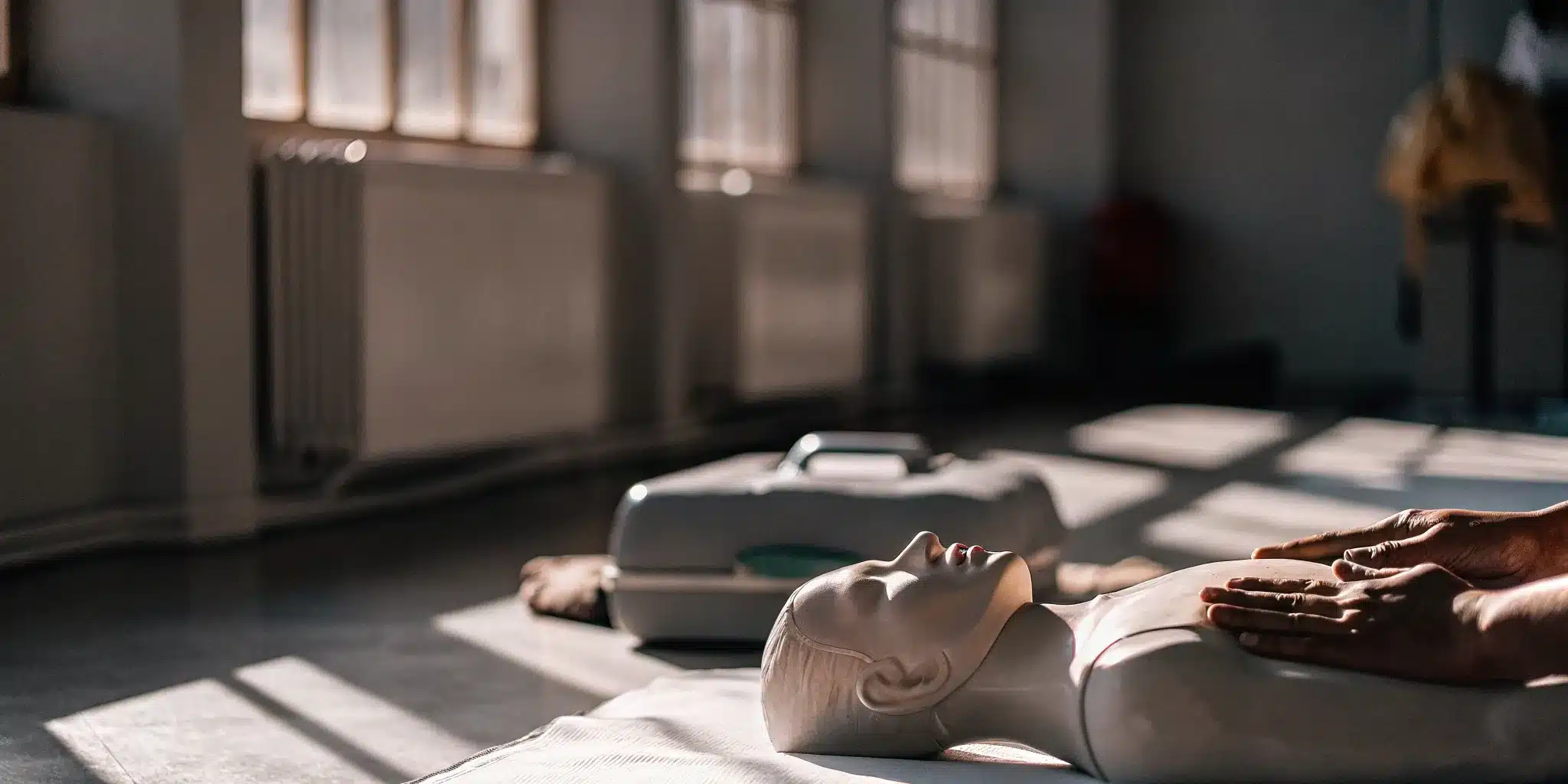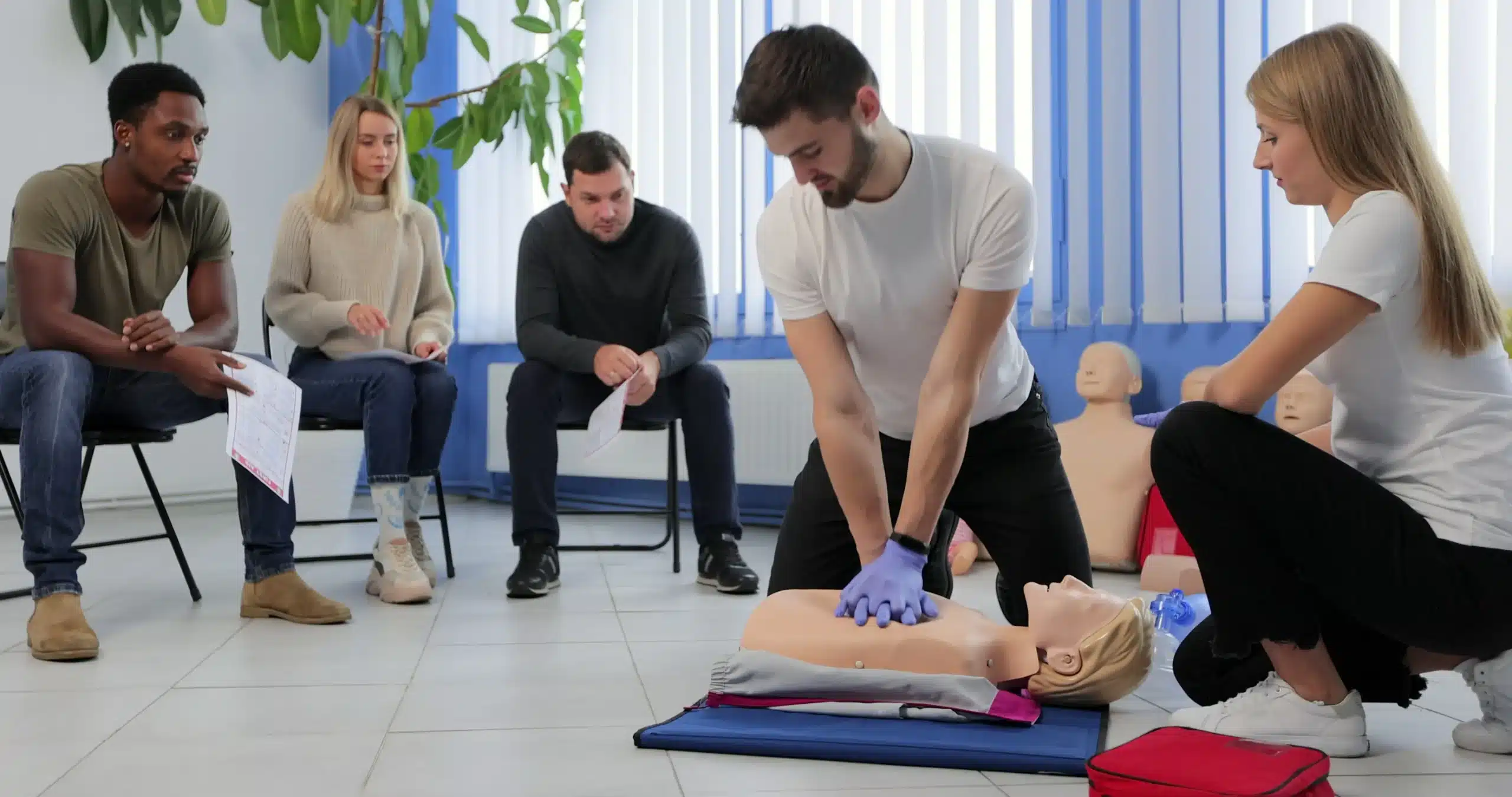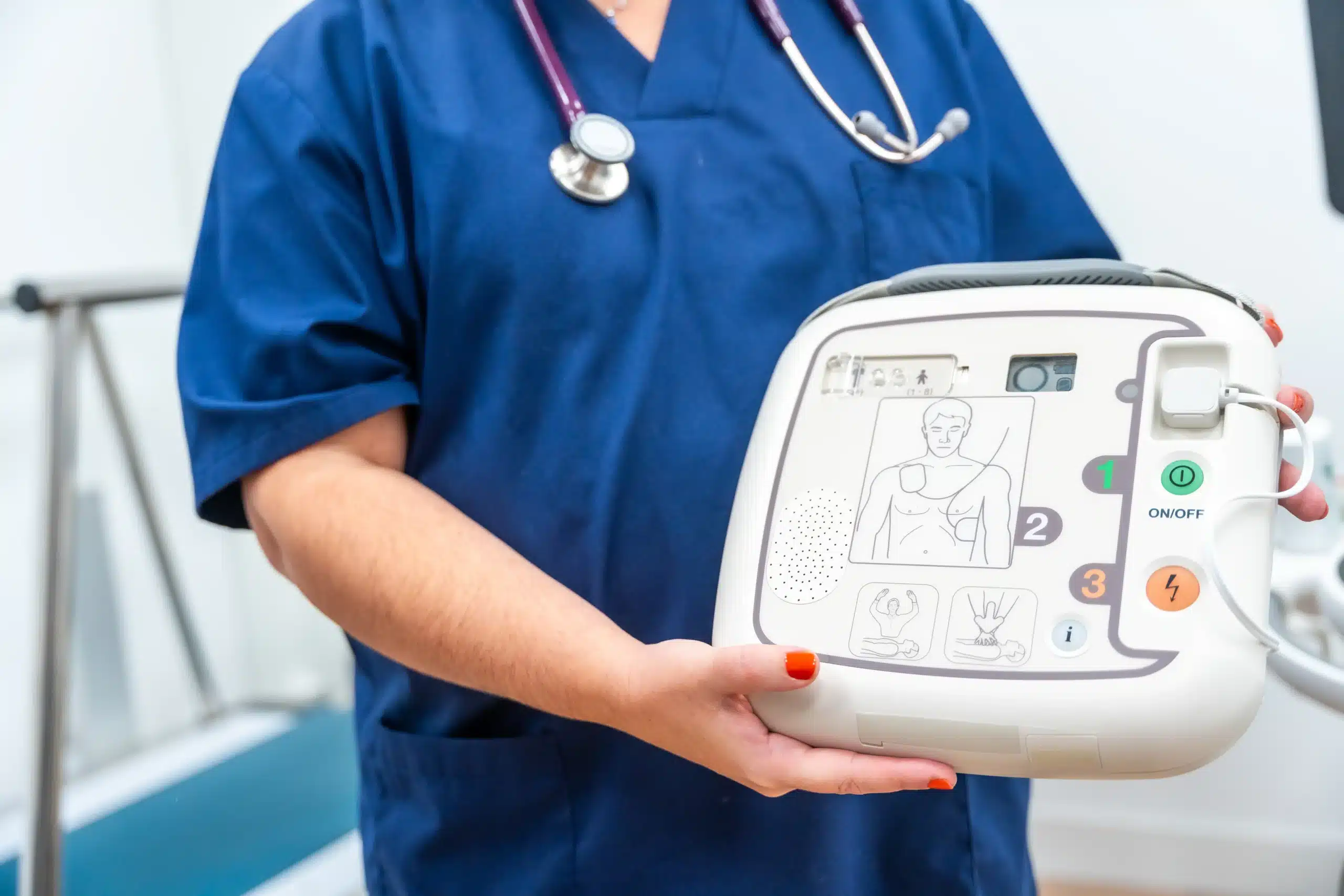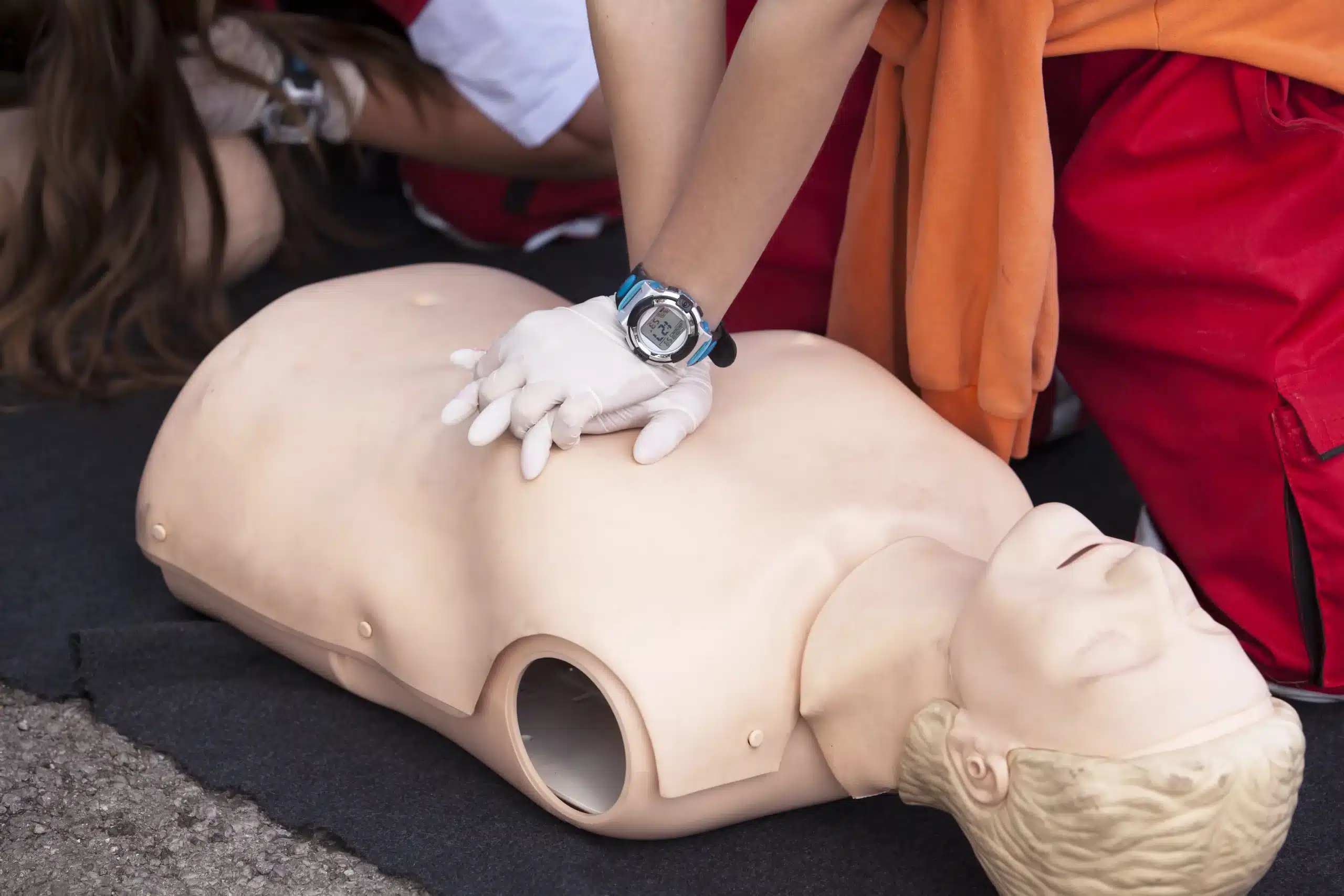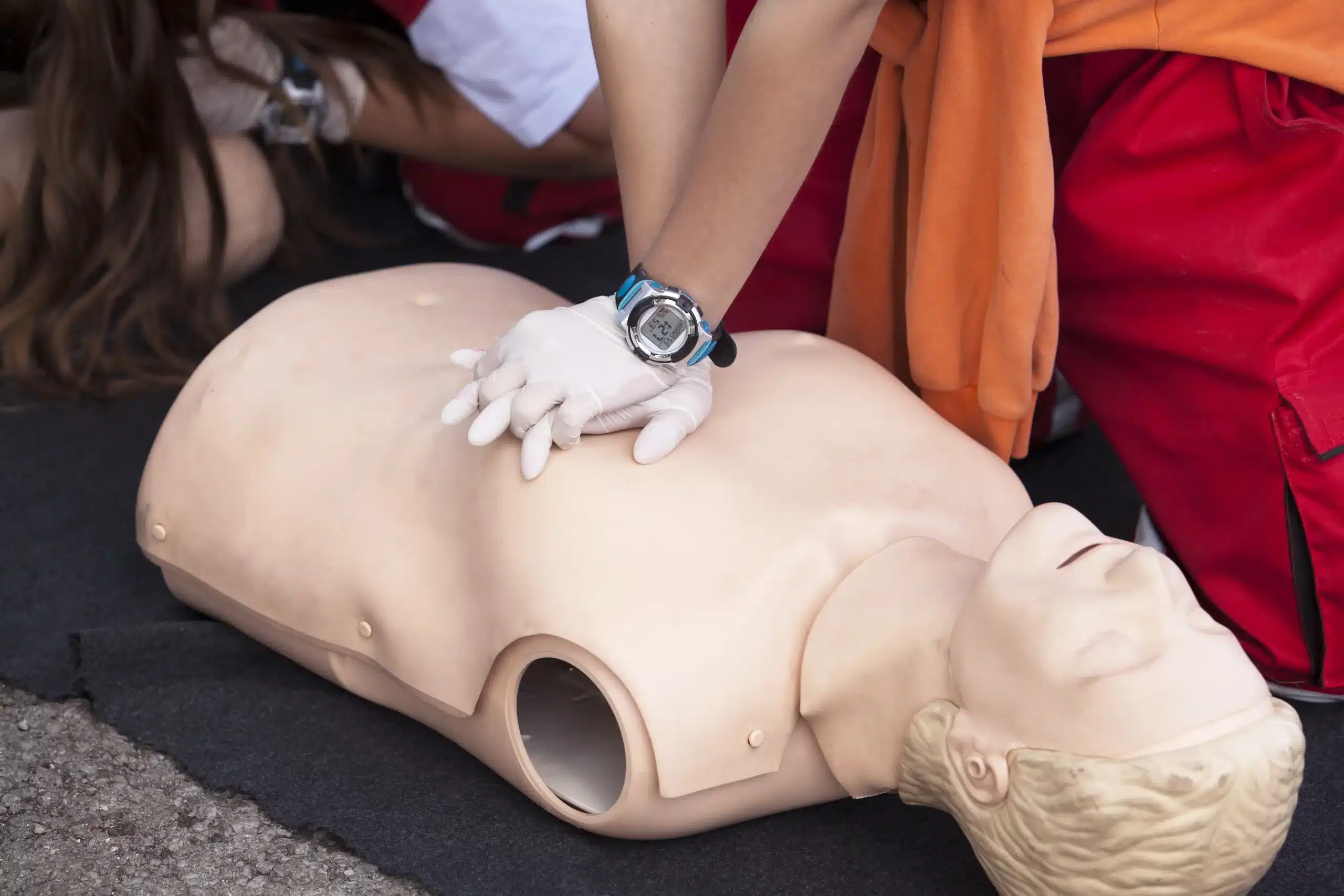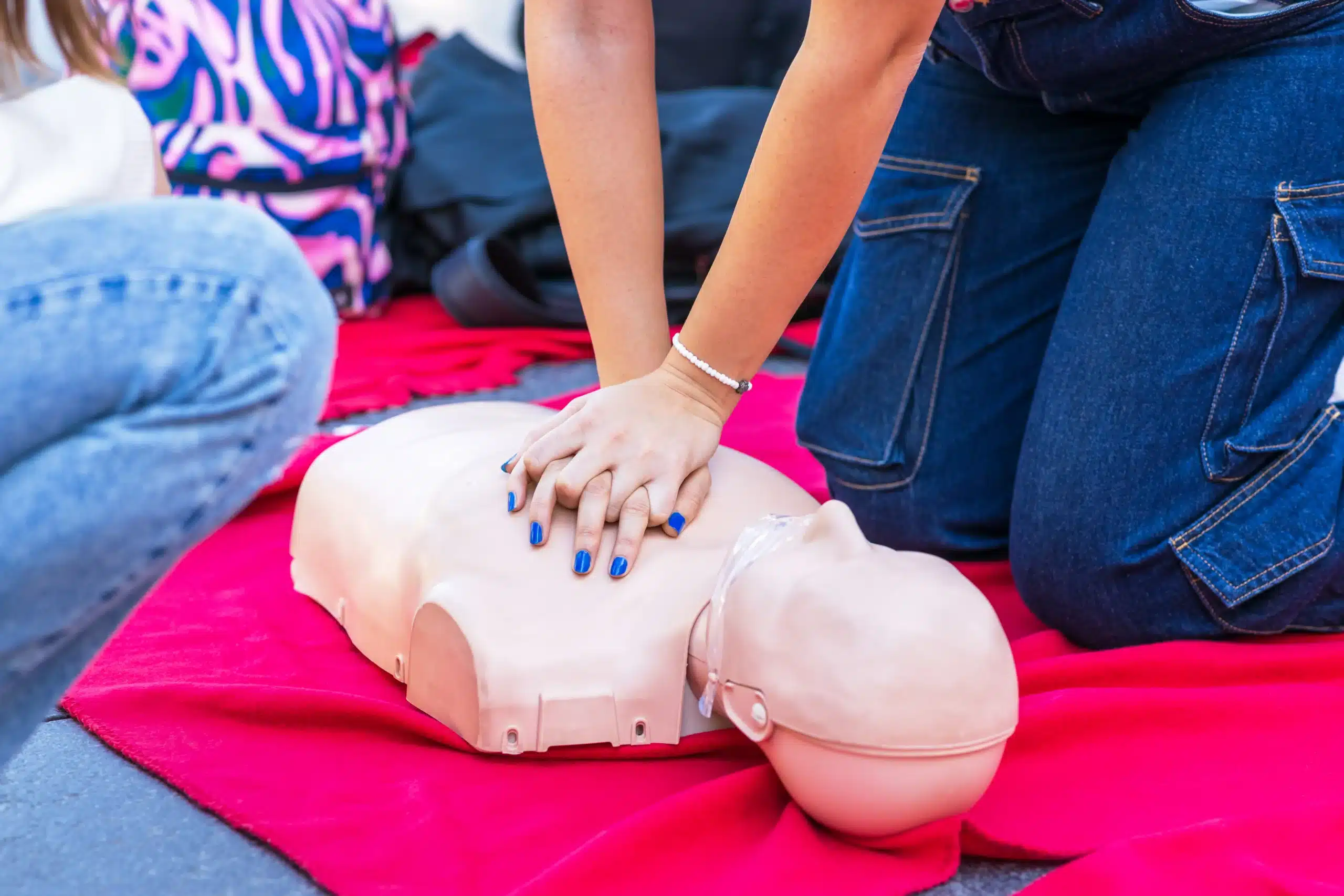CPR—it’s a skill that can make all the difference in a life-or-death situation. But with so many different certifications and training options available, finding the right CPR course can feel overwhelming. This guide simplifies the process, providing clear, actionable information to help you get CPR certified in Daly City. We’ll cover everything from basic CPR and AED training to advanced certifications like ACLS and PALS. Plus, we’ll help you find low-cost CPR certification Daly City options that fit your budget. Let’s explore the world of CPR certification and empower you to save lives.
Key Takeaways
- CPR certification empowers you to save lives: Learn essential CPR techniques for adults, children, and infants, as well as how to use an AED, through a variety of courses tailored to different needs. Find the right course for you and gain the confidence to act in emergencies.
- Affordable training options are available: Discover a range of CPR certification courses in Daly City, CA, that fit your budget. Compare providers like Daly City CPR Classes, explore group discounts, and consider online or in-person learning formats.
- Maintain your CPR skills for long-term preparedness: Keep your certification current and your skills sharp through regular practice and renewal courses. Consistent training ensures you can respond effectively when it matters most.
What is CPR Certification?
CPR (cardiopulmonary resuscitation) is a life-saving technique used when someone’s breathing or heartbeat has stopped. Learning CPR can truly make a difference in emergencies. CPR certification formally recognizes that you’ve received training and can perform CPR effectively. This training typically covers adult, child, and infant CPR, using an Automated External Defibrillator (AED), and how to help someone who is choking. CPR certification is valid for two years and requires renewal to keep your skills and knowledge current. These classes give you the confidence to respond effectively during medical emergencies. Consider getting your CPR certification—it’s a powerful skill to have.
CPR Certification Courses
CPR certification empowers you to respond effectively during medical emergencies. Different courses cater to various needs and experience levels. Let’s explore some of the key certifications available.
Basic Life Support (BLS)
Basic Life Support (BLS) training is crucial for healthcare providers and anyone involved in responding to medical emergencies. This course emphasizes early recognition and management of life-threatening conditions like cardiac arrest, stroke, and airway obstruction. You’ll learn high-quality CPR for adults, children, and infants, proper use of a bag-valve mask, and how to work effectively as a team during resuscitation. BLS certification provides a strong foundation for anyone working in healthcare or aspiring to a medical career. Our CPR and First-Aid certification courses align with American Heart Association guidelines.
CPR/AED Certification
CPR/AED certification focuses on core CPR skills for adults, children, and infants, plus training on using an Automated External Defibrillator (AED). AEDs are portable devices that analyze heart rhythms and deliver a shock to restore a normal heartbeat during sudden cardiac arrest. Learning to use an AED can dramatically increase the chances of survival. This certification is valuable for anyone who wants to be prepared to help in a medical emergency, from teachers and coaches to parents and concerned citizens. This article explains what you’ll learn during CPR training.
Advanced Cardiovascular Life Support (ACLS)
Advanced Cardiovascular Life Support (ACLS) is designed for healthcare professionals who manage complex cardiovascular emergencies. This course builds upon BLS skills and covers advanced interventions such as medication administration, airway management, and ECG interpretation. ACLS certification is essential for physicians, nurses, paramedics, and other healthcare providers working in critical care settings. This guide to BLS certification provides helpful background information.
Pediatric Advanced Life Support (PALS)
Pediatric Advanced Life Support (PALS) focuses on the specialized needs of infants and children during medical emergencies. This course teaches healthcare providers how to assess and manage respiratory distress, shock, and other pediatric emergencies. PALS certification is vital for pediatricians, pediatric nurses, emergency medical technicians, and other professionals caring for children in critical situations. You can explore various CPR training options in Daly City, including PALS.
First Aid/CPR Combination Courses
Combining First Aid and CPR training provides a well-rounded skill set for responding to various emergencies. These courses cover essential first aid techniques for injuries like cuts, burns, and fractures, along with CPR skills for different age groups. A combined First Aid/CPR certification is a practical choice for anyone who wants to be prepared for both medical emergencies and common injuries. Daly City CPR Classes offers combined First Aid/CPR certification.
Affordable CPR Certification in Daly City
Finding the right CPR certification course at an affordable price is easy in Daly City. Several organizations and training centers offer various levels of certification to meet diverse needs and budgets.
Daly City CPR Classes
Daly City CPR Classes provides a range of American Heart Association (AHA) courses, including BLS, ACLS, PALS, and First Aid. They are known for their commitment to low prices and excellent customer service. For those seeking comprehensive training and affordability, this is a great place to start. They also offer specialized courses like EMSA Child Care Health & Safety and RQI programs.
Safety Training Seminars
Safety Training Seminars offers AHA-certified CPR, BLS, ACLS, PALS, and First Aid courses in Daly City. You can find their contact information and potentially course schedules on their Yelp page.
CPR Edu
CPR Edu offers a convenient way to research CPR classes in Daly City. Their site provides information on various providers and certification levels, helping you compare options and choose the best fit.
American Red Cross
The American Red Cross is a nationally recognized provider of CPR training. Their courses cover adult, child, and infant CPR, providing comprehensive life-saving skills. Check their website for class availability and pricing in your area.
Daly City Fire Department
The Daly City Fire Department may offer CPR training programs for residents. Contact them directly to inquire about available courses and community resources. They are a valuable resource for local safety information.
Daly City Public Library
While not a primary provider of CPR training, the Daly City Public Library may offer resources or information on CPR certification in the community. Visit their website or contact them for more information. They often have helpful community resources.
Skills Gained Through CPR Certification
Getting CPR certified equips you with practical, life-saving skills to handle real-life emergencies. This training empowers you to respond confidently and potentially make a difference when it matters most. Let’s explore the key skills you’ll gain through a comprehensive CPR certification course.
Adult, Child, and Infant CPR Techniques
CPR techniques vary depending on the person’s age. A quality CPR course, like those offered at Daly City CPR Classes, covers the specific methods for performing CPR on adults, children, and infants. This prepares you to respond effectively in emergencies, regardless of the individual’s age. You’ll learn to assess the situation, deliver chest compressions, and provide rescue breaths tailored to each age group. This specialized training is crucial because an infant’s physiology and needs differ significantly from an adult’s.
AED Usage and Emergency Recognition
CPR certification also includes training on using an Automated External Defibrillator (AED). These portable devices can significantly improve survival rates during cardiac arrest. You’ll learn to quickly assess the situation, operate the AED, and follow its voice prompts to deliver a potentially life-saving shock. Learning to recognize the signs of a cardiac emergency is equally important. Early recognition is crucial for timely intervention and can dramatically impact the outcome. For more information on AEDs and their use, visit AED.com.
First Aid Skills
Many CPR certification courses, including those offered by the American Red Cross, incorporate essential first aid skills. This combined training allows you to handle a broader range of emergencies, from treating minor wounds and burns to managing more serious injuries like fractures and sprains. These practical skills complement your CPR training, making you a more well-rounded and effective first responder.
Team Dynamics in Resuscitation
Responding to a medical emergency often involves teamwork. CPR training emphasizes the importance of team dynamics during resuscitation, preparing you to work effectively with others under pressure. You’ll learn how to communicate clearly, coordinate tasks, and support each other to provide optimal care. This aspect of training is especially valuable for healthcare professionals and anyone working in team-based emergency response environments. Online CPR Certification offers additional resources on BLS certification and the importance of teamwork in medical emergencies.
CPR Certification Accreditation
CPR certification is essential, especially when lives are on the line. But how can you be sure your certification is valid and up to par? Accreditation is the key. It guarantees your training meets nationally recognized standards, equipping you with the skills and knowledge to respond effectively during emergencies. This section explains what to look for in a high-quality CPR certification program.
American Heart Association (AHA) Accreditation
The American Heart Association (AHA) sets the standard for resuscitation training. AHA-accredited CPR courses, like those we offer at Daly City CPR Classes, adhere to the most current scientific guidelines and best practices for emergency cardiovascular care. Choosing an AHA-accredited course means you’re learning from a trusted and respected source. This accreditation signifies that the curriculum, instructors, and training materials all meet the AHA’s stringent requirements. The National CPR Foundation verifies that its programs align with AHA guidelines, ensuring your training is top-notch. You can confirm this AHA compliance on their site.
OSHA Compliance and Workplace Requirements
Beyond personal preparedness, CPR certification is often a workplace requirement, particularly in healthcare and other safety-sensitive professions. The Occupational Safety and Health Administration (OSHA) establishes standards to maintain workplace safety, and CPR certification is often a critical component of meeting those standards. It’s always a good idea to check with your employer or relevant licensing boards to understand the specific CPR certification requirements for your profession. eCPRVerify maintains a national CPR registry to help verify certifications and ensure compliance. Selecting a program that aligns with OSHA guidelines, such as those offered by Daly City CPR Classes, will help you meet these important workplace safety standards.
CPR Certification Costs
Getting CPR certified is an investment in yourself and your community. Understanding the costs involved can help you find the right training program that fits both your needs and your budget. Here’s a breakdown of what influences CPR certification costs:
Compare Provider Prices
CPR class prices can differ between providers. Doing some comparison shopping is a smart move. For example, Safety Training Seminars offers American Heart Association-certified courses in Daly City, conveniently located near San Francisco and San Mateo. Check with various providers like Daly City CPR Classes to compare pricing and find the best value. Don’t forget to ask about any available discounts, or check out their low price guarantee.
Understand Course Costs
Several factors affect how much a CPR certification class costs. The type of class you need (adult-only, child/infant, or all-inclusive) plays a role. The class format—online, in-person, or a hybrid approach—also influences the price. Finally, the level of certification you’re pursuing (basic CPR or more advanced certifications like ACLS or PALS) will impact the overall cost. CPR and First Aid combination courses are also available.
Online vs. In-Person Training Costs
Online CPR classes are typically less expensive than in-person training. This is often due to lower overhead costs for the provider. However, online courses might not satisfy all workplace requirements. It’s important to check if the online certification is OSHA-compliant, especially if you need it for your job. In-person training offers valuable hands-on practice and direct interaction with an instructor, which can be beneficial for many learners. In-person classes tend to be more expensive because of factors like limited class sizes and the need for physical resources. While you might find cheaper online options, always confirm the certification meets your specific needs and is accepted by your employer or any relevant organizations.
Flexible CPR Learning Options
Choosing the right CPR training format depends on your learning style, schedule, and specific requirements. Let’s explore the different CPR learning options available.
In-Person Hands-On Training
In-person CPR classes offer a valuable opportunity to learn life-saving skills directly from experienced instructors. This format provides a structured learning environment where you can practice techniques on mannequins, ask questions, and receive immediate feedback. This hands-on training builds confidence and ensures you’re fully prepared to respond effectively in real-life emergencies. The interactive nature of in-person training allows you to develop muscle memory and master essential skills like chest compressions, rescue breaths, and AED operation.
Online Courses and Their Limitations
Online CPR certifications offer flexibility and convenience, allowing you to learn at your own pace and from anywhere. However, it’s important to be aware of potential limitations. While online courses effectively teach the cognitive aspects of CPR, they often lack the crucial hands-on practice component. This can affect your ability to perform CPR effectively under pressure. Additionally, some employers and regulatory bodies may not accept online-only certifications, particularly in healthcare settings. Always check the specific requirements of your profession or workplace before choosing an online-only course.
Blended Learning Approaches
Blended learning combines online instruction with the hands-on practice of in-person training. You can learn theoretical concepts and procedures online and then attend an in-person skills session to practice techniques and receive expert guidance. This approach offers a balance of flexibility and practical application, ensuring you develop both the knowledge and skills to perform CPR effectively. A BLS class often uses this blended format, covering essential skills like adult, child, and infant CPR, AED use, and choking prevention. Confirm that any blended learning course meets your state and workplace requirements.
CPR Certification Discounts
Getting CPR certified can be more affordable than you think. Many providers offer various discounts, making this life-saving training accessible to everyone. Knowing where to look can save you money while you gain valuable skills.
Group and Corporate Discounts
If you need to certify a group, whether for your workplace, a community organization, or even a group of friends, consider group discounts. Many CPR training providers, including Daly City CPR Classes, offer reduced rates for groups, lowering the per-person cost. Contact providers like Bay Area CPR to learn about their group discounts and schedule a class. They often offer flexible options, including onsite training to minimize workday disruptions.
Promotional and Seasonal Deals
Keep an eye out for promotional offers and seasonal deals that can make CPR certification even more budget-friendly. Some providers offer discounts during certain times of the year or run special promotions. Check the Daly City CPR Classes website for upcoming courses and any associated discounts. You can also contact their customer service team to ask about current promotions. A little research can go a long way in saving money on your CPR certification.
Choose the Right CPR Certification
Deciding to get CPR certified is a great first step. Now, let’s figure out which certification is right for you. This section will walk you through assessing your needs and comparing available courses and providers.
Assess Your Needs
CPR and first-aid certification empower you with life-saving skills. These courses give you the training and confidence to respond effectively in medical emergencies. Ask yourself why you want to become certified. Is it a job requirement, or do you want to be prepared for family emergencies? Knowing CPR, even if it isn’t perfect, is better than not knowing it at all, and can give you confidence in stressful situations. Think about your specific circumstances and who you anticipate needing to use these skills on. Do you work with children? Are you often around elderly family members? Your answers will help determine the best certification path.
Compare Courses and Providers
Once you understand your needs, you can start comparing courses and providers. Several organizations offer CPR training, including Daly City CPR Classes, Safety Training Seminars, and the American Red Cross. Look at what each provider offers. Do they teach American Heart Association courses like BLS, ACLS, or PALS? Consider factors like class schedules, location, and whether they offer onsite or online training. CPR certification is typically valid for two years and requires renewal, so factor that into your decision. Also, check if the provider offers group discounts or other incentives. Finally, look into their alignment with Good Samaritan laws, which protect those performing CPR in good faith. CPR Education is a good resource for learning more about these laws.
Maintain Your CPR Certification
CPR certification isn’t a one-and-done deal. Staying current with your training is essential for providing effective care in emergencies. This section covers why renewing your certification and practicing your skills is so important.
Renew Your Certification
CPR guidelines and best practices evolve, so regularly renewing your CPR certification is crucial. Generally, CPR certification is valid for two years. Check with your certifying organization, such as the American Heart Association, for specific renewal requirements. Don’t let your certification lapse—stay prepared to respond confidently when needed. Daly City CPR Classes offers various courses to help you stay up-to-date. We also offer a low price guarantee to make staying certified accessible.
Keep Your Skills Current
Even with a valid certification, regular practice keeps your skills sharp. Think of it like any other skill—the more you practice, the more confident and effective you become. Refresh your knowledge of CPR techniques and protocols periodically. Consider attending refresher courses or practicing with friends and family. Bay Area CPR offers helpful resources explaining the importance of CPR training for residents in our area. Remember, even imperfect CPR is better than no CPR. Knowing CPR can give you the confidence to act in emergencies, potentially saving a life.
Related Articles
- Why CPR is Important in Healthcare – Daly City CPR Classes
- Importance & Impact of Workplace CPR & First-Aid Training
- CPR Myths Busted: Learn the Truth About Saving Lives in Daly City
- CPR & First-aid Classes in Daly City, CA – Daly City CPR Classes
- Student Discounts in Daly City, CA for BLS CPR Courses
Frequently Asked Questions
How do I choose the right CPR class for me? Think about why you’re getting certified. Is it for your job, personal knowledge, or both? Consider who you’re most likely to use these skills on – adults, children, or infants. This will help you choose the appropriate level of certification, such as basic CPR/AED, BLS, PALS, or ACLS. Also, consider your learning style and schedule. Do you prefer in-person, online, or blended learning?
What’s the difference between CPR and First Aid certification? CPR focuses on life-saving techniques for someone whose breathing or heartbeat has stopped. First Aid covers a broader range of injuries and illnesses, from minor cuts and burns to more serious situations. Many providers offer combined CPR/First Aid courses, which is a great way to be prepared for various emergencies.
How much does CPR certification cost? The cost varies depending on the provider, the type of course (CPR, BLS, PALS, ACLS), and the format (online, in-person, blended). Check with different providers in your area, like Daly City CPR Classes, and compare their prices. Don’t hesitate to ask about discounts for groups, students, or other special offers.
Is online CPR certification accepted everywhere? While online CPR courses offer flexibility, not all organizations or employers accept them. Some professions, especially in healthcare, require hands-on training. Always confirm with your employer or licensing board to ensure the online certification meets their requirements. If you need hands-on practice, look for blended learning options that combine online coursework with in-person skills sessions.
How often do I need to renew my CPR certification? CPR guidelines and best practices are updated regularly, so renewing your certification is essential to stay current. Most certifications are valid for two years. Check with your certifying organization or training provider for their specific renewal requirements. Regular practice is also important to keep your skills sharp, even between renewals.
This article was written for free by MEGA SEO.


